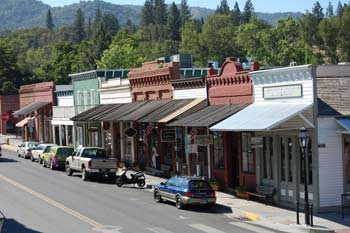On the Importance of HARC
At eighty-two, this mayor is acutely aware of the differences between generations. In my youth, I saw anyone over thirty as an “old fogy” and unwilling to change with the times. Now, being one of those “old fogies,” I understand both sides, fully realizing the perspective that well-meaning, enthusiastic progressives bring to any dialogue, which understanding brings me to the subject at hand, something all generations can agree on: the importance of our heritage as a historic treasure. If that is true, then there should be no disagreement concerning the importance of HARC and its role in our city’s governance. (HARC: Historic Architectural Review Commission)
 I say this because from time-to-time there does seem to surface some frustration on the part of citizens who either do not understand the importance of HARC, or who feel emphasis on any associated historical significance tends to pre-empt the energy needed for some development or activity they feel important. Let’s take a look at one such example in recent years… the growth of the wine industry. There may be those who doubt the economic viability of such an enterprise, but consider the significant number of entrepreneurs willing to invest their time and money in vineyards and retail outlets. Given the potential impact on local employment, increased tax revenues for local government, and increased tourism, success in these efforts would certainly be beneficial to our entire community. Even so, such development in no way diminishes neither the value nor the importance that HARC brings to Jacksonville. Thus, would it not behoove the city and its citizens, to emphasize and support HARC. No one can argue that our charming, historic setting is what provides our developing wine industry with an advantage over neighboring communities.
I say this because from time-to-time there does seem to surface some frustration on the part of citizens who either do not understand the importance of HARC, or who feel emphasis on any associated historical significance tends to pre-empt the energy needed for some development or activity they feel important. Let’s take a look at one such example in recent years… the growth of the wine industry. There may be those who doubt the economic viability of such an enterprise, but consider the significant number of entrepreneurs willing to invest their time and money in vineyards and retail outlets. Given the potential impact on local employment, increased tax revenues for local government, and increased tourism, success in these efforts would certainly be beneficial to our entire community. Even so, such development in no way diminishes neither the value nor the importance that HARC brings to Jacksonville. Thus, would it not behoove the city and its citizens, to emphasize and support HARC. No one can argue that our charming, historic setting is what provides our developing wine industry with an advantage over neighboring communities.
I make this observation because, even as I write this, HARC is undergoing a crucial transformation. Gary Collins, who served with distinction as Chair, has been succeeded by Trish Murdoch. Donna Bowen has joined HARC and Owen Jurling has been chosen as liason between HARC and the Planning Commission, a position previously held by Art Krueger. Finally, Sally Melgard has retired from HARC after years of distinguished service.
These are fundamental changes, but, to quote a cultural epithet: “Wait there’s more.” An even greater change is about to take place. HARC’s duties are delineated in Title 18 of the Jacksonville Municipal Code. However, Title 18 has not served the HARC body well at all in recent years. That is about to change! Under the auspices of Planning, HARC, Administration, the City Council, and your Mayor, Title 18 will be rewritten, thereby correcting some serious deficiencies that impede HARC from fulfilling its primary task: protecting irreplaceable historic sites and structures. Look around and you see the failure of Title 18 evidenced by a historic building that should never have been allowed to have an even bigger building attached to it… and it should never have been moved in order to accommodate changes. Yet HARC has been unable to prevent destruction of this nature to our historic buildings because Title 18 failed in this regard.
Regardless of anything else, the most important item on this year’s council agenda, are these impending code changes. These critical changes will give HARC teeth in its designated task of protecting our city’s priceless heritage. With such a daunting task fulfilled, the charm of the past will endure for our children and grandchildren, and a sound and healthy climate remains for our business community and much-needed and welcome tourism.

 Paul Becker is the current Mayor of Historic Jacksonville, Oregon.
Paul Becker is the current Mayor of Historic Jacksonville, Oregon.
Mayor Becker:
Thank you so much Mayor for being the Mayor and as such say that HARC is the most important stance we can take for and against growth in Jacksonville. For: Because it needs to be written exactly how and why we have HARC to serve in our community in keeping the status quo. (If others do not know the status quo read HARC 1991 elements for protection of Jacksonville History. Written and used as regulatory element to preserve an Historic site that is very unusual in its’ coming about of character and nature-Jacksonville, Oregon.) Against: Stipulations (oversight requests stimulating from regulations of the HARC) that significantly overlook HARC “requests-which are truly HARC regulations of our city of Jacksonville” as to how and where building can take place. Yes Mr. mayor the committees (HARC) cannot continue to give the “proceed” to many of these stipulations from owners/etc. of buildings and land. Whatever HARC says must be adhered to and the reviews given to planning should also reflect the sameness as we go forward.
Nina R Schmidt, Trustee of 370 S 5th Street, Historic Property, National Register from Oregon Historic Site Maps: ID#40337. August 23, 2016
Jacksonville Historic Charter
It is now just days after the November 8th, 2016 vote and I want to express my appreciation to the people of this town and acknowledge their wisdom to leave the
Historic Charter intact and without alteration.
I have to wonder why it is that the City and Council would want to change the Charter. Could it be to legitimize past violations of the Charter that have taken place numerous
times over the years?
It’s a simple idea, like waving a magic wand over a toad to “Make him a King”.
The newest proposal by the city is to rewrite the building codes Chapters, 16, 17 and 18. Could it be that they were poorly written in the first place, which lead to a failure of
implementation?
Is that why we have new pseudo-historic structures on the same lot as historic structures, that, overwhelm (being built above the peak of historic structure) and stand over
32 feet in height and are attached to the single story historic structure?
This is not a fanciful notion I describe, but reality.
This is how poorly and ambiguous the existing building codes have served not to honor the Historic Charter, but to trample it into the ground.
I would expect that with regard to any historic town, that the building codes would be written to comply with the Historic Charter, but in the case of Jacksonville, it appears
to be the other way around, or could be if the Charter could only be rewritten. Darn it!
I ask the people of Jacksonville to attend the upcoming open meetings that will determine the future landscape of what Jacksonville will look like 20 years from now and
understand how it will impact the quality of your lives.
Will we have open views of the historic buildings in the future or will there only be a wall of new development that buries them? The implementation of the building codes in
the past has given us comments like, “Whoops! and Sorry about that!” and will continue unless the codes are written without ambiguity or complexity and comply word for word with
the guidelines of the Historic Charter.